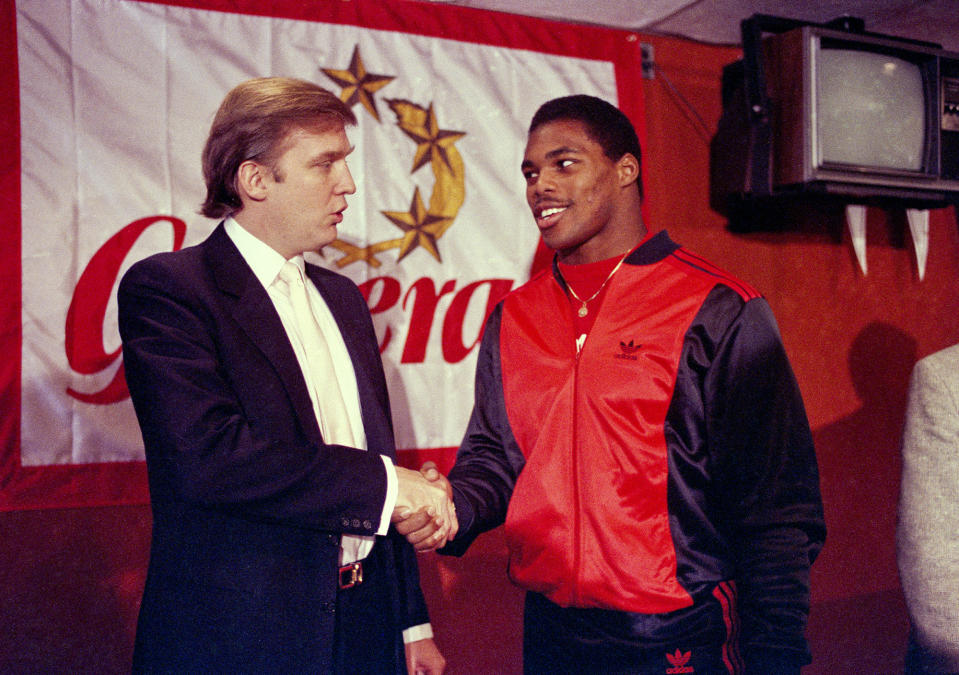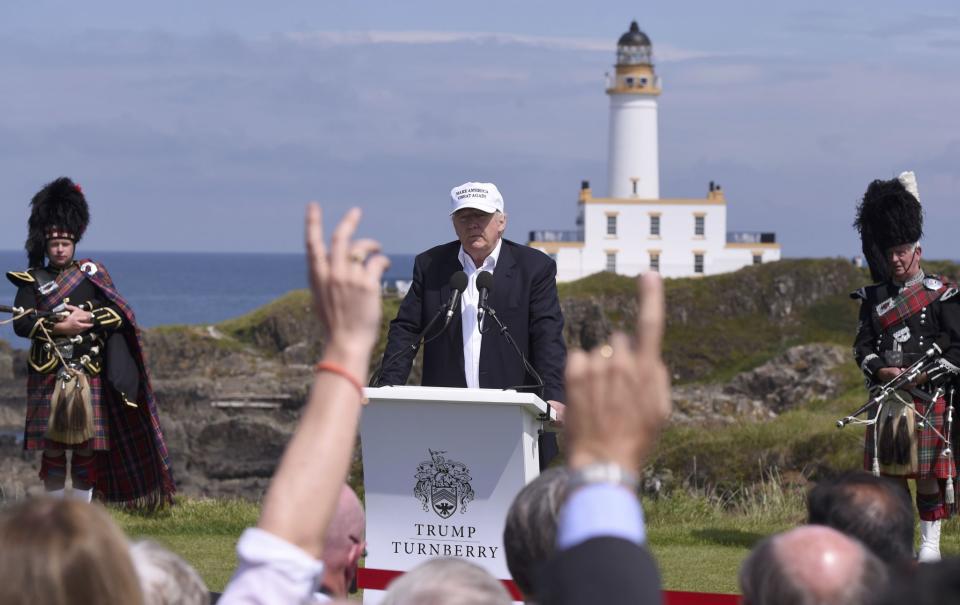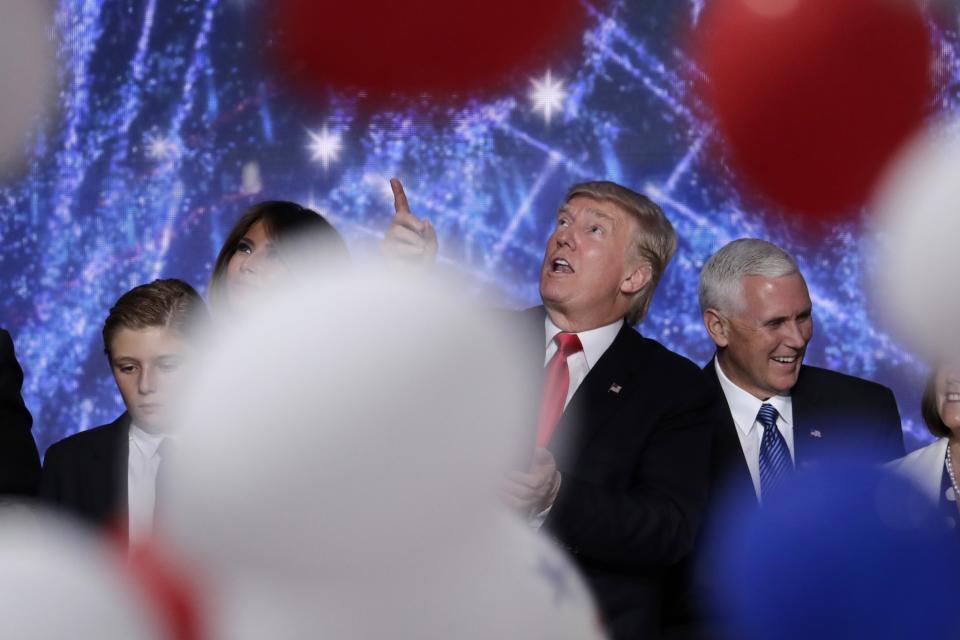Donald Trump’s fine art of losing

In 1983, Donald Trump bought one of the teams in the new United States Football League, with grand plans of making himself the center of sports — the center of everything — in New York. He would build Trumpdome for his New York Generals to play in. He would then use his team as leverage to merge into the far more lucrative NFL.
By 1984, when his plan didn’t work, he came up with another one — sue the NFL for $1.3 billion instead, claiming antitrust violations. Technically, he won the suit — but the jury award totaled $3.76 in the end. (No, that is not a typo.) To Trump, however, this was a huge victory.
“After taxes, I would say I lost $3 million,” he said at the time, but “I got a billion dollars of free publicity.”

How does Donald Trump lose?
The answer, apparently, is that he never does. At least not in his own mind. To review his life and talk to people who have watched him for decades is to realize that he has never once seen himself as anything but the victor. And that realization both explains much of his 18-month campaign for the White House and gives hints as to what might happen should he lose on November 8.
“He’s never imagined to himself or conceded to himself that he’s lost anything ever,” says Harry Hurt III, author of “The Lost Tycoon: The Many Lives of Donald J. Trump” — a title Hurt says Trump reportedly “can’t stand because it implies he’s a loser.”
In a series of conversations, more than one of Trump’s biographers noted that he regularly calls others what he fears himself to be — the obese man calling women fat; the man who works hard to hide his balding scalp insulting women who aren’t a 10; the candidate who visibly tires near the end of long debates calling other candidates “low energy”; the man who is on tape describing his own lewd behavior toward women saying it’s his opponent’s husband who is a “sexual predator”; the businessman who makes questionable use of his private foundation and the U.S. tax code, then calls his opponent “crooked” for months and then says she’s the one who’s been “nasty.”
But “loser” is the jab he uses most. “His deepest insult is to call someone a loser, his deepest fear is him being regarded as a loser, because deep down he knows that he himself is a loser,” Hurt says.
Gwenda Blair, author of “Trump: Three Generations of Builders and a Presidential Candidate,” agrees. “It’s elementary psychology,” she says. “If you are that outspoken about it, it’s a source of your own anxiety.”
“Never lose” was a lesson learned early, and like most things about Trump’s life, its roots can be found with his father. Fred Trump was a successful builder in Brooklyn, who regularly exaggerated how successful he was, and regularly told his five children that they would also make it in a cutthroat world because “you are a killer, you are a king.” The family’s religious leader was Norman Vincent Peale, who preached: “Formulate and stamp indelibly on your mind a mental picture of yourself as succeeding. Hold this picture tenaciously. Never permit it to fade.”

At first, the heir apparent to Fred Trump’s business was his older son, Fred Jr., known as Freddy, who, as it happened, was neither “killer” nor “king,” but rather a gentle, awkward young man, whose mistakes brought tongue-lashings from his father. Donald watched and learned. “I saw people really taking advantage of Fred, and the lesson I learned was always to keep up my guard 100 percent,” he would say in a Playboy interview years later.
So it was Donald, the winner, who eventually took over the Trump Organization. Freddy, the loser, would become an airline pilot and eventually die of complications related to alcoholism.
Throughout the campaign, and earlier still in a number of biographies, Trump has been repeatedly referred to as a narcissist. Indeed, a pathological fear of losing is one symptom of narcissistic personality disorder, says Dr. Jamie Howard, a clinical psychologist in the Anxiety and Mood Disorders Center of the Child Mind Institute in Manhattan. Other traits include “grandiosity, an inflated perception of one’s own achievements, and a big need for admiration from other people,” she says.
Dr. Howard wants to be clear that she cannot diagnose a disorder from afar, without an assessment of an individual. But there is perhaps no American political figure whose psyche has been so transparently on display as Donald Trump’s. Modern campaigns in particular, with social media removing the filter between candidate and voter, serve as a kind of “MRI for the soul” in the words of longtime Democratic strategist David Axelrod, and so for those who feel they recognize Trump in her description, Howard wants to make clear that narcissists are not pretending to win while knowing they have not, as much as they are not able to see it as failure in the first place.
“This is self-protection,” she says. “Narcissists have a very fragile sense of self. Any small mistake would shatter that, so they can’t really acknowledge that it ever happens because it is a threat to their self-concept.” Self-reflection and introspection are similar threats, so narcissists tend to avoid such things. Their refusal to apologize comes from an inability to see that they’ve done anything wrong.
So when Donald Trump says he showed his brilliance by going bankrupt, or the he respects women more than anyone else ever, or that he has won every presidential debate, it may well be that he really believes this, and should he ever have glimmers of doubt, he is well practiced at banishing them. That would explain, in part, why his Twitter storms declaring his superiority so often come in odd hours of the night, when fears and regrets loom larger for all of us. As he shouts digitally into the darkness, is he aiming to convince his followers, or himself?
Trump has spent a lifetime refusing to lose. Often he does so by moving his own finish line, redefining success midway, says Michael D’Antonio, author of “The Truth About Trump.” “He sets a new goal in the middle of the game,” he says. “So if the analogy is running a 10K race, and he saw that someone was making a move and catching up to him, he would stop at 5K and declare that had been his real goal all along.”

Trump did a version of that in Scotland, where he announced he would build a sprawling resort with two golf courses, a hotel and thousands of homes. After a fierce zoning fight that “threw the whole country of Scotland into an uproar,” D’Antonio says, Trump was permitted to build just one course, leaving the rest of the property undeveloped. “He said that was his win, that he would hold the property until it became more valuable.”
His other protective tactic is to declare he did not really lose, because the other side cheated. Hillary Clinton summarized this approach in the third debate, saying:
“Every time Donald thinks things are not going in his direction, he claims whatever it is, is rigged against him. The FBI conducted a yearlong investigation into my emails. They concluded there was no case. He said that the FBI was rigged. He lost the Iowa caucus, he lost the Wisconsin primary. He said the Republican primary was rigged against him. Then Trump University gets sued for fraud and racketeering. He claims the court system and the federal judge is rigged against him. There was even a time when he didn’t get an Emmy for his TV program three years in a row and he started tweeting that the Emmys were rigged.”
That was when Trump interrupted. “I should have gotten it,” he said, meaning the Emmy. It was a telling moment. Here he was in front of the last nationwide audience of his campaign, there to prove he was statesmanlike rather than petty, and still he could not resist arguing he’d been cheated out of an Emmy for a reality show.

So, what does this mean for the next time? If he loses? If the vote doesn’t go his way on Election Day, how will he respond to a failure that is more measureable and more public, with denial less possible than at any other point in his lifetime?
If past is prologue, there is little to indicate that he will take time to re-evaluate his life goals.
“This would be a ‘Saul-on-the-road-to-Damascus moment,’ and he is incapable of doing that,” Blair says. “He’s armor-plated, so even if such a thought were to somehow enter his mind he wouldn’t let it stay for long. “He has stamped indelibly on his mind his vision of himself as a winner. I don’t see how that’s ever going to go away. I guess I wish it would, because it’s better for Donald and the rest of us.”
More likely, he has already shown signs of his two-front response – being an “anticipatory loser” in the words of Slate political writer Jacob Weisberg; or, put another way, “whining before the game’s even over,” in the words of President Obama.
First, he has been suggesting for months that the system is rigged against him. It is not a new belief, and he seems to find reinforcement of it in many a life experience, starting in the 1970s, when his father Fred Trump was found to have discriminated against African-Americans who applied to rent Trump apartments, and both father and son felt singled out. In the decades following, he has regularly been held at arm’s length by the New York business community, still the boy from Queens feeling like he can’t quite break into the closed society of Manhattan. That long-simmering complaint has been given new fuel during this campaign, culminating in the furor he created at the third debate when he said he hadn’t decided whether he would accept the outcome should he lose. His reason? The media and the voting process were rigged against him.
“I will look at it at the time,” he said. “I will keep you in suspense, OK?”
Suspense — as though a cliffhanger were necessary for this latest installment of his reality show.
At the same time, his biographers and quite a few politicians and pundits in both campaigns see him already redefining the goal.
“I think he originally began this whole campaign as a brand-building exercise, and I think no one was more surprised than Donald Trump about how far he got,” Hurt says. “At first, he thought if he just made a decent showing in a primary or two and got some publicity then he could bow out and it would count as a win.”

Then, D’Antonio adds, “he started to win, and I think that for a while, up until the convention, he actually thought he could be president. My guess is that, with the first debate, he realized he couldn’t” and then his finish line began to shift. The real goal would be to start a political movement, D’Antonio theorizes. Then, when “he hired Steve Bannon … the goal became a media empire that would convert fear and rage and paranoia into a profit center for himself, and possibly launch another political party.”
Trump has specifically said he has no interest in so-called TrumpTV. But the New York Times has reported that Trump son-in-law Jared Kushner initiated talks with an investment bank that funds media startups. The talks went nowhere, the Times reported, but the fact of the meeting appears to indicate interest. Similarly, CNN reporter Brian Stelter ran into Trump campaign manager Steve Bannon on a flight to Las Vegas for the third debate. He posted video of Bannon riding the AirTrain and answering a question about TrumpTV or some kind of streaming network by saying “Trump is an entrepreneur.” Pointing to Trump’s ubiquitous social media presence, he said, “Look at the engagement. It’s incredible,” he said. “They’ll go live on Facebook and get a million viewers.”
But between today and whatever comes next there is Election Night, which polls indicate will pose a dilemma for the Man Who Does Not Lose. Will he give a concession speech? He did give a rather gracious one when he lost the first Republican caucus, in Iowa, but by the next day he had all but taken it back, essentially demanding a do-over because, he said, Ted Cruz had stolen the election. This time, Blair thinks a concession is still possible. “People have conceded without actually saying ‘I lost,’ so he might be able to get one out,” she says. “But in his own mind, I don’t ever think he will think he lost. That’s almost like him believing the sun goes around the Earth.”
Hurt expects Trump will start talking about the value of the publicity he’s gotten from the campaign — perhaps not on Election Night, but soon after. D’Antonio thinks he might even go so far as eventually bragging that by running, he got the RNC to pay his own company to fly him around in his own airplane and hold events at his own properties.
What these biographers don’t believe he will do is either recognize or acknowledge the damage he left in his wake — to the Republican Party, to the state of political discourse, to those he insulted along the way. He has created such damage before without such acknowledgement. Take his lawsuit against the NFL. What Trump saw as a net win because of the publicity was also the death knell for the USFL, which disbanded shortly thereafter.

In his book “Trump: The Greatest Show on Earth,” author Wayne Barrett describes a conversation Trump had during his early days of team ownership, before the lawsuit, with Myles Tannenbaum, one of the USFL’s founders and an owner of the Philadelphia franchise. Tannenbaum was concerned that Trump’s wild spending on players would cripple the fledgling league.
“When you’re in New York you have to win,” Barrett quotes Trump as saying, explaining why he had to spend more than others.
“In Philadelphia, you have to win too. You have to win everyplace,” Tannenbaum said.
Trump replied: “I need to win more.”



